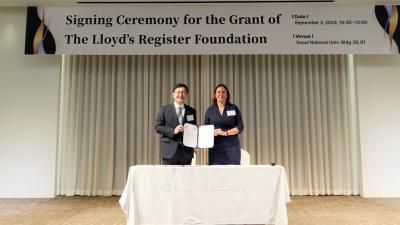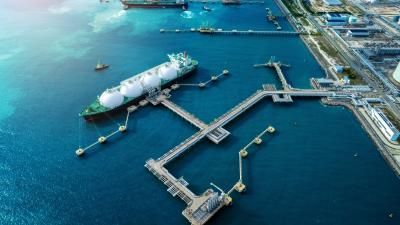
£4M grant for maritime safety research at Seoul National University
Lloyd’s Register Foundation grants £4M to Seoul National University for research to enhance maritime safety and address global challenges.
This page is approximately a 4 minute read
This page was published on

Professor Yonghwan Kim, Professor
The sea is the birthplace of human life and a treasure trove of infinite resources. Conquering the sea is humanity’s dream, but the sea can also take human lives and is a place where many dangers lurk. There are countless factors that threaten the safety of ships, which are means of transportation at sea. Compared to simple risk factors in the past, such as human factors of crews or severe weather, which accounted for a large proportion, recently, as eco-friendly smart ships have become more sophisticated, the risk factors due to electrical and electronic equipment as well as mechanical equipment have increased significantly. And if damage occurs, the scale of damage can be enormous. For this reason, international organisations such as IMO and Lloyd's Register have recently strengthened regulations on safety at sea.
The Lloyd's Register Foundation Research Center for Safety of Future Ship in Seoul National University is conducting research in three areas starting in September 2024, focusing on ship safety issues related to the development of future ships.
The first area is the safety of alternative fuels. In order to achieve the Zero Carbon goal for marine vehicles by 2050, ship fuels such as oil or natural gas are going to be replaced with ammonia or hydrogen. Considering the current pace of technological development, it is certain that engines using ammonia as fuel will soon be installed on medium and large-sized merchant ships. However, ammonia has the risk of being toxic and threatening the lives of seafarers. In addition, ammonia or hydrogen is stored in liquid form in fuel tanks or cargo tanks, and since the tanks are subject to impulsive hydrodynamic pressure or repeated hydrodynamic loads due to sloshing, there is also a risk of damage to the tank structure for low-temperature or ultra-low-temperature insulation. Studying the risks associated with these next-generation fuels is one of the main research areas of Lloyd's Register Foundation Research Center.
The second topic of interest is the dynamic stability of ships in waves. The motion performance of ships in waves is a traditional field of shipbuilding, but recently, nonlinear dynamic behaviors that can cause capsizing of ships or serious cargo loss are being regulated by IMO and others. Lloyd's Register Foundation Research Center is mainly interested in establishing analysis procedures for nonlinear roll motions occurring in large ships, and it is expected to develop a preliminary draft of international regulation.
The third theme of Lloyd's Register Foundation Research Center is related to the smartening of ships. Recently, as AI techniques are rapidly developing, there are increasing cases where existing theoretical analysis or numerical computation is being replaced by AI-based digital techniques. It is expected that the application of these AI techniques will greatly contribute to predicting risks and ensuring safety of ships. Lloyd's Register Foundation Research Center conducts research on techniques to improve the operational efficiency of ships and enhance navigation safety in waves. In addition, research will be conducted to define various risk factors that may occur as autonomous navigation functions are expanded and to determine the level of risk.
The research is being or will be conducted by experts from multiple universities in Korea, including Seoul National University, and also from various countries such as Japan, Norway, the UK, and the US. The research results will be shared for the public benefit. To synergise these research activities, many institutions, including Korean shipyards, provide leveraging funds.
The activities of Lloyd's Register Foundation Research Center are not limited to research. It carries out various activities to train experts in related fields, such as operating global exchange activities for students and international internship programs. These activities are aimed at supporting young students and researchers and fostering them as future talents in related fields.
As well as this, the center is also making efforts to foster female engineers. The percentage of female engineers in the Asian region is not high compared to Western countries, and Lloyd's Register Foundation Research Center is paying special attention to fostering female marine engineers. It encourages the activities of female engineers through the Women in Engineering program and various other supports.
The work we do here at the Lloyd’s Register Foundation Research Center is vital in the ongoing efforts to pioneer research to enhance ship safety. As our research gathers momentum, we want to make sure that the future of shipping remains secure, efficient and resilient. Our commitment to safety must remain unwavering as we strive to harness the vast potential of our oceans while protecting those whose livelihood depends on them.
